Polymarket Supported and Restricted Countries
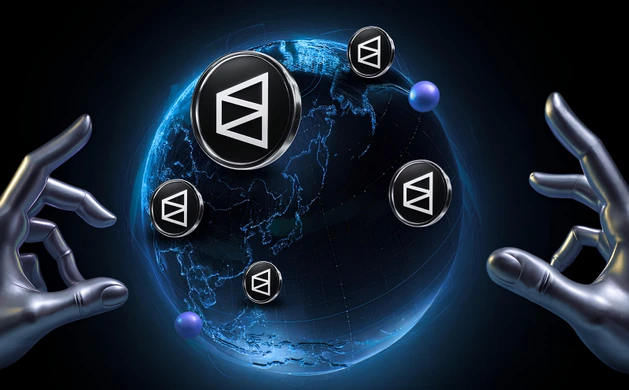
Summary: Polymarket restricts trading in the US, UK, France, Belgium, Poland, Singapore, Australia, Taiwan, Thailand, Ontario, and in US-sanctioned territories such as Iran, Cuba, and North Korea.
Outside those, Polymarket remains widely accessible in over 180 countries, using USDC with optional onramps through centralized exchanges and demand is concentrated in a few large markets.
Polymarket is a decentralized prediction exchange built on Polygon using USDC, recently valued at $8 billion after ICE’s $2 billion investment and US regulatory expansion.
Access & Regulation
Restricted in 15 regions; CFTC-licensed US pathway available
Funding & Investors
Backed by Intercontinental Exchange & 1789 Capital
Main Markets
Politics, Finance, Inflation, Crypto, Sports, and Global Events
Polymarket Restricted Countries
Polymarket currently restricts users from about 15 countries and regions, according to the platform's Terms of Use. Below are the most material restricted areas and how access is curtailed:
- United States: Access is geoblocked following a CFTC settlement; residents are barred from sign-up, depositing, and trading on the global interface.
- United Kingdom: Unavailable without a UKGC license; Polymarket self-restricts British users and enforces geofencing to prevent market access and settlement.
- France: Classified as unlicensed gambling; French residents are blocked, with geo-fencing applied to viewing, trading, deposits, and outcome settlement.
- Belgium/Poland (EU): Selected EU states blacklist Polymarket as unlicensed gambling; Belgium and Poland block domains and warn residents that usage is illegal.
- Canada (Ontario): Ontario’s iGaming regime requires authorization; Polymarket excludes Ontario addresses, while access in other provinces depends on local positions.
- Singapore: Remote gambling rules deem the service unlawful; the regulator blocks access and prohibits residents from participating in Polymarket markets.
- Australia: Interactive gambling restrictions enforced by ACMA; ISPs and the platform implement blocks, and advertising or targeting Australians is prohibited.
- Sanctioned territories: Residents of sanctioned jurisdictions are prohibited under OFAC, EU, UN, and UK sanctions policies; screening and attestations enforce compliance.
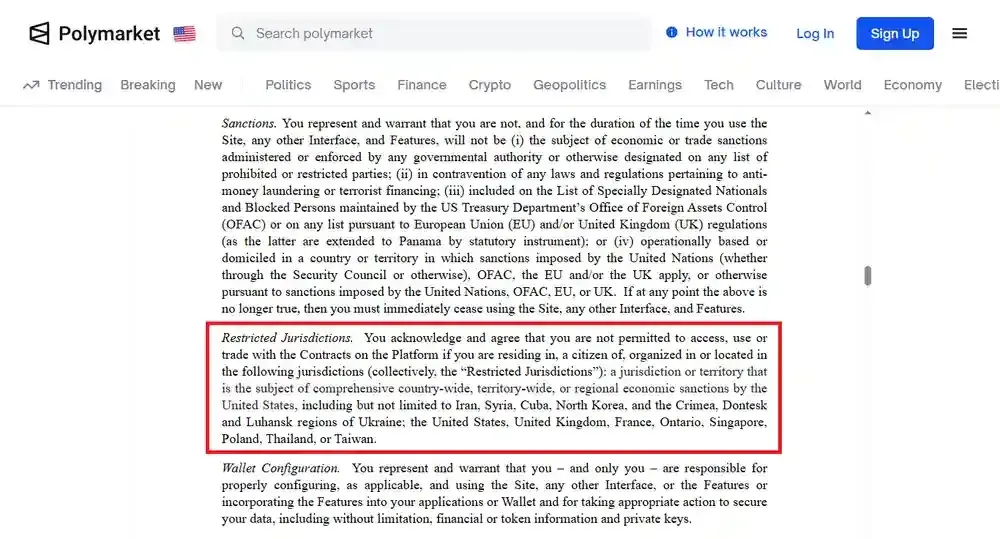
Polymarket Supported Countries
Polymarket is broadly available in well over 180 countries outside the restricted list, spanning much of Europe, Asia (excluding blocked markets), Africa, and Latin America. Practically, this enables a large cross-border audience to access event markets where local rules do not require a gambling or derivatives license.
Deposits are made with USDC on Polygon, with onramps including exchange transfers (e.g., Coinbase) and network support for Ethereum, Base, Arbitrum, Polygon, and Solana where applicable. Card and bank purchases are available via MoonPay in supported regions, with limits and availability varying by location and payment rail.
Traffic estimators report multi-million monthly visits and a diversified audience. Recent snapshots from Similarweb show ~6.3 million monthly visits, with top traffic shares from the United States (~31%), Germany (~7%), Canada (~5), Vietnam (~4%), and United Kingdom (~3%).
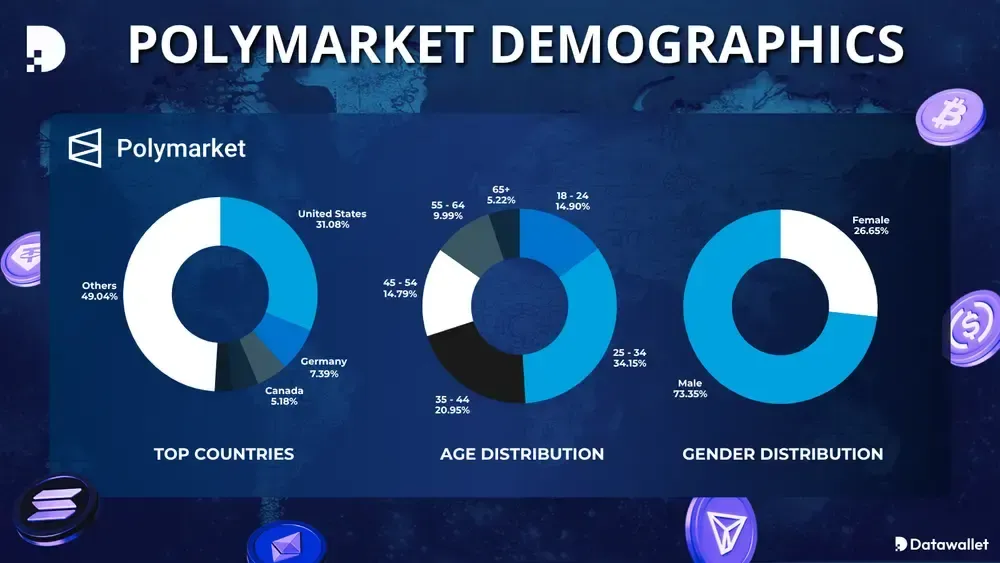
Polymarket Licenses and Regulation
Polymarket generally operates without traditional gambling licenses, controlling availability with geoblocks and Terms while pursuing regulatory pathways in select markets. Where authorization is required, residents are restricted and circumvention is prohibited:
- United States: Post-2022 CFTC settlement, the global site geoblocks Americans; a US pathway arrived via the 2025 QCEX acquisition (CFTC-licensed).
- European Union: No pan-EU authorization; France, Belgium, Poland treated Polymarket as unlicensed gambling and imposed national blocks.
- United Kingdom: No UKGC approval; the platform self-excludes UK residents under its Terms.
- Canada (Ontario): Ontario requires iGaming authorization; Ontario residents are excluded, while other provinces may differ.
- Asia-Pacific: Singapore and Australia classify unlicensed remote gambling as illegal; access is blocked and marketing restrictions enforced.
Polymarket KYC Requirements
For the global (non-US) interface, Polymarket typically allows no-KYC access: connect a wallet, fund with USDC and trade. However, the platform can request verification if risk triggers arise, including suspected US residency or policy breaches, with close-only mode or closure for non-compliance.
KYC can be time-bound and specific: users flagged may be asked to provide residency/ID within ~14 days to keep trading and withdrawals available. Third-party onramps (e.g., MoonPay/Coinbase) may impose their own KYC, and any regulated US product requires full KYC/AML before onboarding.
Can I Use Polymarket in the USA?
Polymarket’s main site is not available to US users under its current terms; since January 2022 the platform has blocked access from the United States to comply with a CFTC. In practical terms, if you are located in the US and visit Polymarket, you will be geoblocked and unable to trade on the global platform.
However, this situation is changing: as of late 2025, Polymarket is on the cusp of launching a US-only regulated service after obtaining CFTC approval via its QCEX. This new US Polymarket will let Americans participate legally (likely on a separate domain) with the requisite KYC/AML checks and federal oversight.
Until that product is fully live, US residents cannot legally use the international Polymarket site and any attempt to do so (such as via VPN) violates the Terms of Use and could result in account. As of late October 2025, a Polymarket index predicts the platform will go live in the United States by the end of the year.
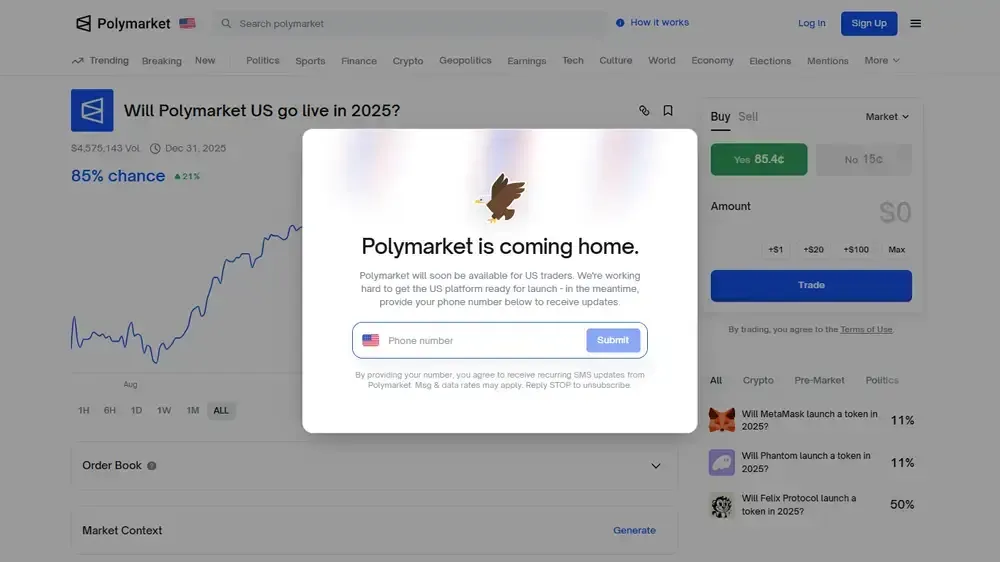
About Polymarket
Founded in 2020 by Shayne Coplan, Polymarket is a blockchain-based prediction platform with over 60,000 daily users. The platform enables users to trade on real-world outcomes through non-custodial wallets, ensuring transparency, liquidity, and decentralized market access.
During the 2024 US elections, Polymarket became the largest prediction market, handling over $3.3 billion in wagers on the presidential race. The platform’s election data gained global attention after accurately reflecting Donald Trump’s win and other campaign developments ahead of traditional polling.
In 2025, Polymarket secured an up to $2 billion investment from the NYSE parent, Intercontinental Exchange, valuing it at $8 billion. This milestone followed the QCEX acquisition, granting Polymarket a CFTC-licensed US pathway and advancing its goal of mainstream financial integration.
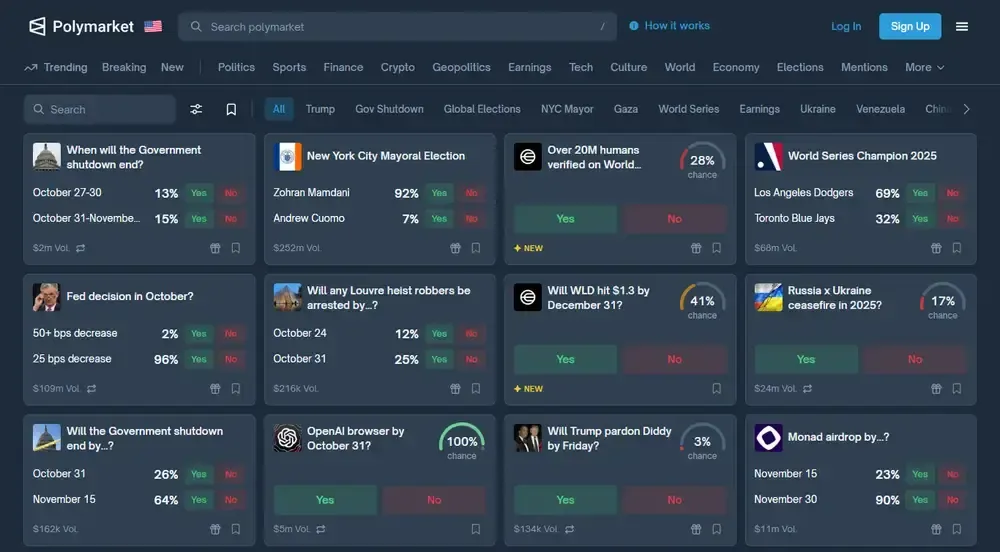
Best Alternative if Polymarket Is Restricted in Your Country
If Polymarket is blocked or unavailable, the best alternative is Kalshi, a US-regulated exchange offering event-based markets under CFTC oversight. Founded by Tarek Mansour and Luana Lopes Lara, it lets users legally trade outcome contracts on topics such as elections, economics, and policy changes.
In August 2024, the CFTC approved Kalshi Klear LLC as a registered Derivatives Clearing Organization, reinforcing its compliance framework. Following a May 2025 court victory, Kalshi gained the green light to offer political event contracts, securing its position as the first fully legal prediction exchange in the US.
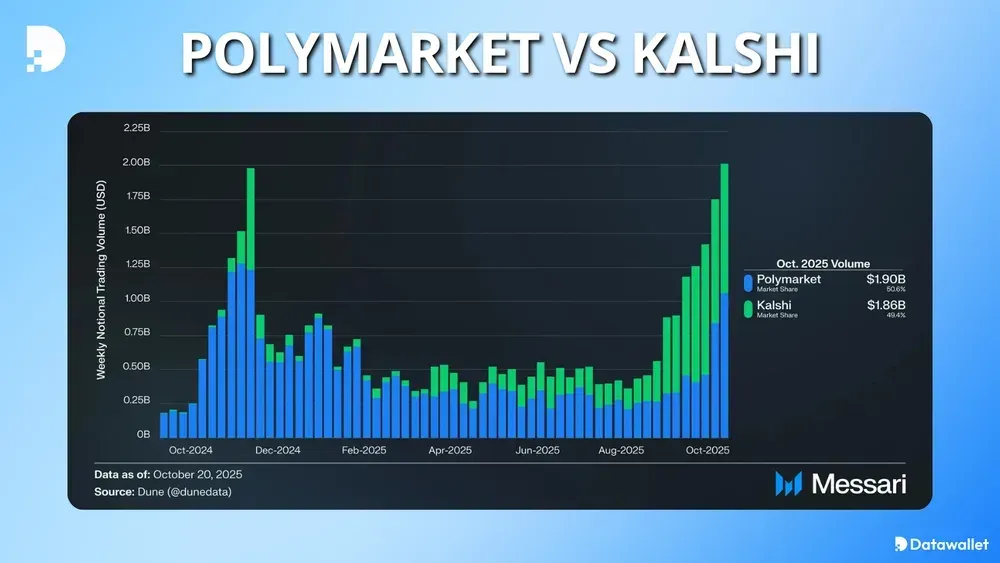
Final Thoughts
Polymarket’s geographic limitations highlight the ongoing clash between a borderless crypto platform and localized regulations. The service has had to pull out of major markets even as its global popularity soared.
Interestingly, user traffic data shows Polymarket drawing millions of visits (and considerable interest from Americans and Europeans) despite official blocks, suggesting that demand for prediction markets often outpaces legal acceptance.
Looking ahead, Polymarket’s strategy of working with regulators (e.g. its US re-entry via a licensed exchange) indicates a path toward legitimacy and broader access.
Frequently asked questions
Is Polymarket available in the UK?
No, without a UK Gambling Commission license, Polymarket self-restricts UK residents, and geoblocking is enforced under the Terms.
What’s Polymarket’s status in Australia?
Australia’s Interactive Gambling Act and ACMA enforcement led to platform and ISP blocks; Australians should treat Polymarket as unavailable unless official guidance changes.
Can I use a VPN to access Polymarket from a restricted country?
No. The Terms prohibit circumventing geo-blocks via VPNs/proxies; detection can trigger close-only mode or account closure.
Which fiat methods are available without cards?
Users can fund via crypto transfers (USDC on Polygon) or use supported onramps (e.g., Coinbase integration, bank transfers via MoonPay) where permitted locally.
%25201%2520(1).webp)
Written by
Emily Shin
Research Analyst
Emily is passionate about Web 3 and has dedicated her writing to exploring decentralized finance, NFTs, GameFi, and the broader crypto culture. She excels at breaking down the complexities of these cutting-edge technologies, providing readers with clear and insightful explanations of their transformative power.

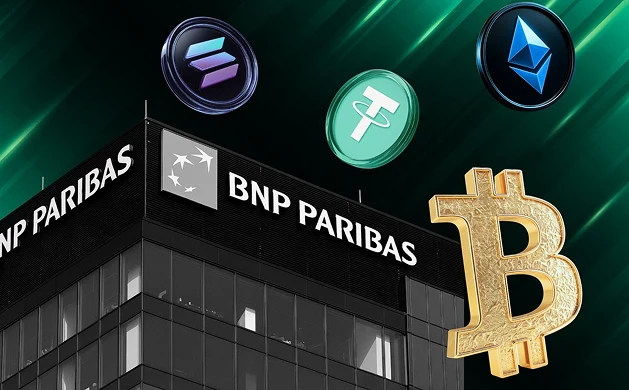
%2520(1).webp)

.webp)





